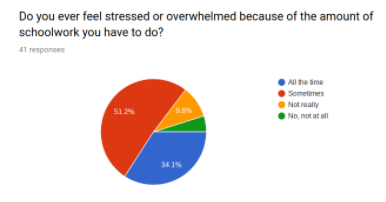Stressed? You could be damaging your health

January 9, 2020
It’s 9:oo p.m. on a Tuesday night, and you haven’t started any of your homework. You have a test on Wednesday that you haven’t started studying for and an essay due Thursday, that thanks to your procrastination, you haven’t started yet either. You’ve started making up excuses for your behavior, trying to make it seem reasonable that you haven’t started any of your work, but you’ve known about your test for two weeks and have had multiple class periods to get started on your essay.
You try and figure out how you’ll get all your work done, but that fluttering feeling rises in the pit of your stomach. This isn’t the first time you’ve postponed starting your work, and you know situations like these never end well.
This is a prime example of stress caused mainly by procrastination. Stress affects your education, your mental health, and your well-being. It is common in students, since they have a lot of work to do for school, and tend to hold off until the last minute. This can lead to bad grades, which can impact a person’s future and career.
According to Dr. Barbara Knappmeyer, a program manager in the Life Sciences Department at the New York Academy of Sciences, “Short-term stress leads to heightened awareness and a boost in energy, however long-term stress can lead to problems with sleep, memory and concentration.” Dr. Knappmeyer also stated that it is widely accepted that long-term stress can increase the risk of anxiety and depression, especially in adolescents, since their prefrontal cortices aren’t fully developed yet.
Adding onto her previous statements, Dr. Knappmeyer suspects that “Procrastination probably has a negative effect on learning outcomes. It is an inefficient strategy that usually leads to bad grades. To be able to learn and remember something in the long-term, you have to work through it more than once. The more often you work through it, the better you will remember.” Dr. Knappmeyer claims there is a pattern in students, in which they hold off doing work or studying until the last minute, which is an unhealthy habit that can affect a students education and overall mental health.
According to Sophie Polatnick, an iSchool freshman and self-proclaimed procrastinator, “Procrastination makes it harder for me to get things done efficiently, which affects my sleep schedule and makes me tired during school.” Polatnick adds that she has felt stress because of her procrastinating habits, and feels as though it affects the effectiveness of her work. She claims to recall procrastinating “every time I do my homework.”
Zoey Ojalvo, another iSchool freshman and self-proclaimed procrastinator, states, “I put things off until the last minute, so they’re probably not as good as they would be if I’d planned my time and started earlier.” She claims she feels stressed because of the amount of procrastinating she does, because she has to work on big assignments right before they’re due.
Based on the results of a survey taken by a number of iSchool students, 37 of the 41 surveyed postpone working on schoolwork up until the last minute the majority of the time. 26.3% of the students surveyed said they procrastinate on schoolwork all the time, while 31.6% said they procrastinate on schoolwork most of the time. 31.6% of those surveyed also claimed they sometimes procrastinate on schoolwork. The survey results indicated 89.5% of the students surveyed tend to procrastinate, or have procrastinated, on schoolwork.
Of the 41 students surveyed, 34.1% always feel stressed because of the amount of work they have to do for school, and 51.2% sometimes feel stressed because of the amount of schoolwork they have to do. This being said, a mere 14.7% of students said they never feel stressed because of the schoolwork they have to do.

18.2% of the students surveyed claimed procrastination affects their education in both a positive and negative way. While it helps them learn how to work under pressure, it also makes them more stressed. It teaches them that it is okay to hold off on working on things at the last minute if they get a good grade on the assignment and they get the work done in time.
As stated by Skylar Anderson of Study Right, in his article, “Procrastination: 3 Reasons it’s Worse Than You Ever Thought it Was,” he states that procrastination results in lower grades and more stress. Anderson mentions how your memory works better when given breaks and time to decompress, so naturally, procrastination doesn´t allow your memory to work at its optimum ability.
The article, “Why Do Students Procrastinate?” from Oxford Learning, comments, “Students often procrastinate because they don’t see how a project is relevant or important to them, don’t understand the material, or just don’t know how to get started.” The article states that procrastination can put a dent in a person’s mental health, in which they experience more frustration, guilt, stress, and anxiety. In extreme cases, procrastination can lead to low self esteem and depression. Leaving things until the last minute can greatly impact a person’s future.
Numerous studies have shown that procrastination often creates stress and anxiety, both of which aren’t good for your health and well-being. It is important to budget time well, break down larger projects into more manageable chunks, and not wait to complete certain tasks. Your physical and mental health could very well depend on it.

